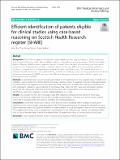Efficient identification of patients eligible for clinical studies using case-based reasoning on Scottish Health Research register (SHARE)
Abstract
Background Trials often struggle to achieve their target sample size with only half doing so. Some researchers have turned to Electronic Health Records (EHRs), seeking a more efficient way of recruitment. The Scottish Health Research Register (SHARE) obtained patients’ consent for their EHRs to be used as a searching base from which researchers can find potential participants. However, due to the fact that EHR data is not complete, sufficient or accurate, a database search strategy may not generate the best case-finding result. The current study aims to evaluate the performance of a case-based reasoning method in identifying participants for population-based clinical studies recruiting through SHARE, and assess the difference between its resultant cohort and the original one deriving from searching EHRs. Methods A case-based reasoning framework was applied to 119 participants in nine projects using two-fold cross-validation, with records from a further 86,292 individuals used for testing. A prediction score for study participation was derived from the diagnosis, procedure, pharmaceutical prescription, and laboratory test results attributes of each participant. Evaluation was conducted by calculating Area Under the ROC Curve and information retrieval metrics for the ranking list of the test set by prediction score. We compared the most likely participants as identified by searching a database to those ranked highest by our model. Results The average ROCAUC for nine projects was 81% indicating strong predictive ability for these data. However, the derived ranking lists showed lower predictive performance, with only 21% of the persons ranked within top 50 positions being the same as identified by searching databases. Conclusions Case-based reasoning is may be more effective than a database search strategy for participant identification for clinical studies using population EHRs. The lower performance of ranking lists derived from case-based reasoning means that patients identified as highly suitable for study participation may still not be recruited. This suggests that further study is needed into improvements in the collection and curation of population EHRs, such as use of free text data to aid reliable identification of people more likely to be recruited to clinical trials.
Citation
Shi , W , Kelsey , T & Sullivan , F 2020 , ' Efficient identification of patients eligible for clinical studies using case-based reasoning on Scottish Health Research register (SHARE) ' , BMC Medical Informatics and Decision Making , vol. 20 , 70 . https://doi.org/10.1186/s12911-020-1091-6
Publication
BMC Medical Informatics and Decision Making
Status
Peer reviewed
ISSN
1472-6947Type
Journal article
Description
W.S. is a PhD student funded by the University of St Andrews where T.K. and F.S. are faculty members.Collections
Items in the St Andrews Research Repository are protected by copyright, with all rights reserved, unless otherwise indicated.

